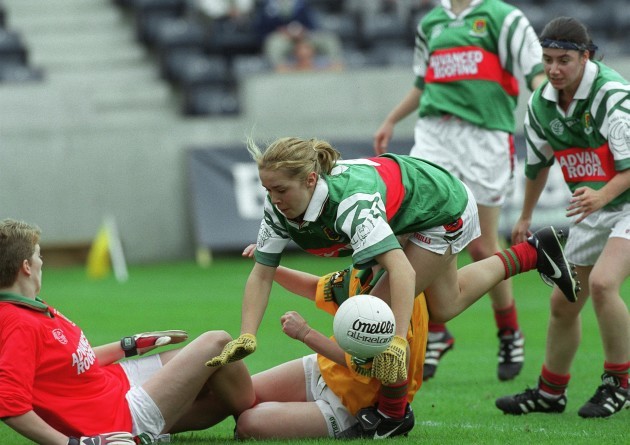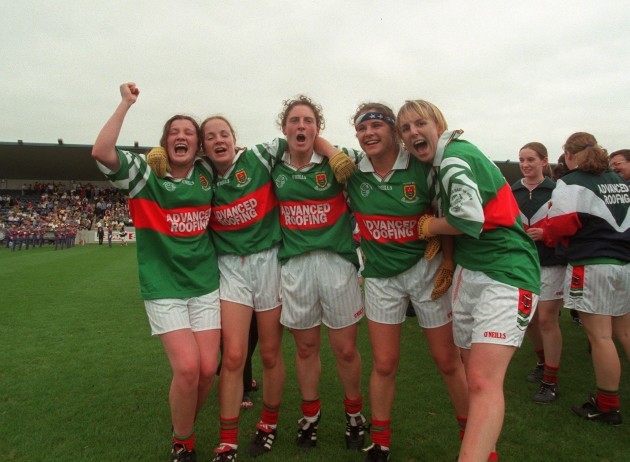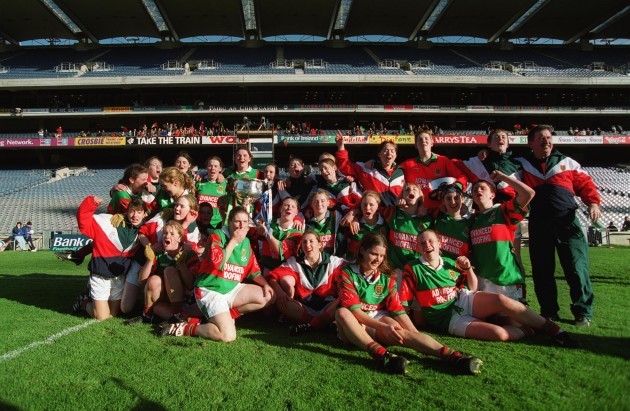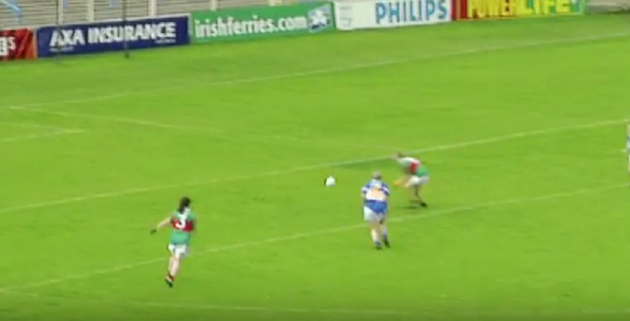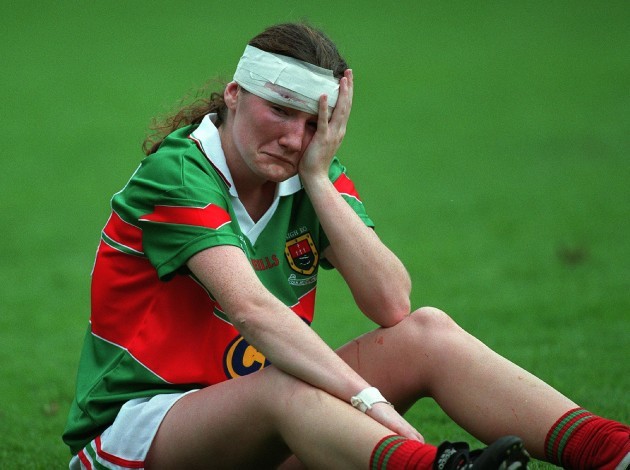FORMER MAYO PLAYER Denise Horan got the distinct sense that 1999 would be their year.
They carried the weight of six successive All-Ireland semi-final defeats on their shoulders, and considering they were the only senior Connacht team in Ladies football at the time, they were effectively still chasing a first championship victory.
Horan, who came into the squad as a teenage goalkeeper in 1993, believed that the law of averages would one day intervene to help them break through that barrier.
But when a new management team of John Mullin, Jonathan Mullin and Finbar Egan was appointed at the outset of the ’99 season, she soon discovered the flaws in that theory and started putting her faith in something else.
“They came in and I realised this is not a law of averages thing, there is a huge step up here. What we’re doing this year is very different. And when we were leaving the training pitches of Mayo throughout that summer having put in a hell of a lot of hard work, we realised that we’d been doing something very different.
You rarely came away with any energy left in your legs after training in Balla and Breaffy. I have particular memories of Balla, where we would do sprints up and down the pitch multiple times. And if one player didn’t make it under a particular time, we’d all have to do it again.
A new sense of fortitude and mental resilience was forged in those torturous sessions, and although the keepers didn’t need the stamina in order to excel in their position, they were given no exemptions from the fitness drills.
“When you’re a goalkeeper,” Horan continues, “you’re probably not the fastest so for me, it was an awful lot of serious running. It was a real effort and we used to come away from the pitch so many times barely able to breathe or stand.
“Other players would pull us along. The faster ones and the ones with the greater stamina would literally pull others along so that we could get over the line under the time.”
The Mayo players were rewarded for their compliance with the tough training, when they triumphed against a much-fancied Meath team in the All-Ireland semi-final.
Although they would go on to experience All-Ireland glory on four occasions, Horan considers the result against the Royals to be a personal highlight.
“Waking up the morning after the Meath game still stands out as one of my great memories that I’ve had in my career in ladies football. Just waking and knowing, ‘God, we’re in an All-Ireland final.’
“There can be a lot of noise on All-Ireland final days but then there’s that satisfaction of when you wake up the next morning and knowing that it’s real, and for me after the Meath game, that was very real.
“I remember doing an interview with Jim Carney after we won the semi-final and I said, ‘we are where we want to be now, but we’re not going to Croke Park to make up the numbers.’
“It had taken us a hell of a long time to get there and we’re not going just to have a nice day out in Croke Park.”
They followed through on that promise by defeating reigning champions Waterford in the final that year, and the three additional titles between 2000 and 2003, marked out a golden period in the history of Mayo Ladies.
Their success can be attributed to the innovative and progressive training that converted the players into better athletes. But they were also blessed to have a new batch of talented players who knew nothing of the miserable years that preceded the victories.
Horan’s early years coincided with that winless time in Mayo, although she was encouraged by what was a new and exciting step in her career.
“It was a great time. I was very young, I was 15 and it was really exciting to get the call-up before the All-Ireland semi-final. We lost to Laois that time after a replay. It was a whole new experience.
“It was a whole new experience. When you come in at 15 and you’ve never played with these senior girls before, you don’t really have any nerves. You’re kind of shy and quiet, and you’re playing with adults.
“People were doing their best, we had a very dedicated management team there. But the set-up was far less professional than it is now.
It wasn’t unusual to have the odd player smoking at half-time in the dressing room or definitely going out for a cigarette as soon as the game was finished.”
“It was a very different time. Now, they were great players as well but it was just a different time in Ireland and a different time for the sport.”
Mayo dominated the landscape of ladies football in the early 2000′s, but the 2001 championship will always conjure up harrowing images for the players.
By this stage, they had pocketed two All-Ireland titles with a three-in-row at stake against Laois in the final.
Horan insists that they were still driven to retain the Brendan Martin cup, but they were facing a side that had previously been beaten in seven All-Irelands.
That was a level of hunger that Mayo simply could not compete with.
“I do think we were really motivated, and when we went in in 2001, we were never complacent, we were in really good shape. I remember thinking that morning that there was no reason why we shouldn’t win this All-Ireland final.
And that’s the very thing that would trip us up.
“When you win All-Irelands, you don’t complacent, and you want to win as much as ever. But your hunger cannot be as great as the team that has never won. There’s nothing you can do to guard against that or overcome that because that is simply the reality of the difference between the two teams.”
In what was a compelling contest, Mayo lost their crown in the most bizarre way to the contenders. With the teams locked in a drawn game, and the clock winding down towards the zero mark, Horan was standing over a kick-out.
Staunton made an approach to catch the ball short, and Horan delivered the pass accordingly. What the keeper didn’t know was that Staunton was unaware of an important rule about where she could receive it.
“I knew the rule and Cora didn’t know the rule, and I didn’t know that Cora didn’t know the rule, so I didn’t expect her to pick it up inside the 21′. Now, on reflection, and I’ve always accepted this, I should have hit it long and just got rid of it.
“But Cora came looking for it, and I thought Cora was a safe pair of hands to pass it to. But I knew the rule and I shouldn’t have chanced it, and that will always be my regret of that day.
“I took responsibility for that and I genuinely did feel it was my fault. I really did just want the ground to swallow me up.”
Horan was tormented by guilt over the incident and it haunted her for months. She became withdrawn from her friends and struggled to find the closure she needed to put it behind her.
For a month or more afterwards, I cried every day, usually driving to or from work or moments when I was on my own. I was playing soccer at the time and I remember asking the manager at half-time of a match to take me out of goals and put me out field.
“I didn’t want to meet people initially because I didn’t want to face what had happened.
“It was a very public mistake and defeat, and I’ve said it before that the pain of defeat is a much stronger emotion than the elation, of victory. 2001 stays with me far more than ’99, 2000 or 2002.
“Losing in Croke Park is awful.”
For the second consecutive Sunday this September, All-Ireland glory beckons for Mayo.
When Horan won her first All-Ireland she laments that it was difficult to truly drink in the moment on the pitch on account of all the ceremonious stuff that winners have to fulfill.
“They’re not your moments in a way. You don’t have the moment to yourself to savour,” she explains.
She was fortunate enough to take in more and more of the occasion throughout her four winning visits to Croke Park, and later today, another group of Mayo players will hope to live that experience.
Some of them are seeking out a fifth All-Ireland medal, while others, who have never played on this stage before are looking to win just once.
Mayo don’t always have the best luck in All-Ireland finals, but Horan is hopeful that this team can break that cycle, and bring some silverware back out West.
“I just hope from a Mayo point of view that next Monday, we’ll be welcoming a victorious Mayo team home. It would be great for the county and great for the ladies to come back and win another All-Ireland.”
Subscribe to The42 podcasts here:
